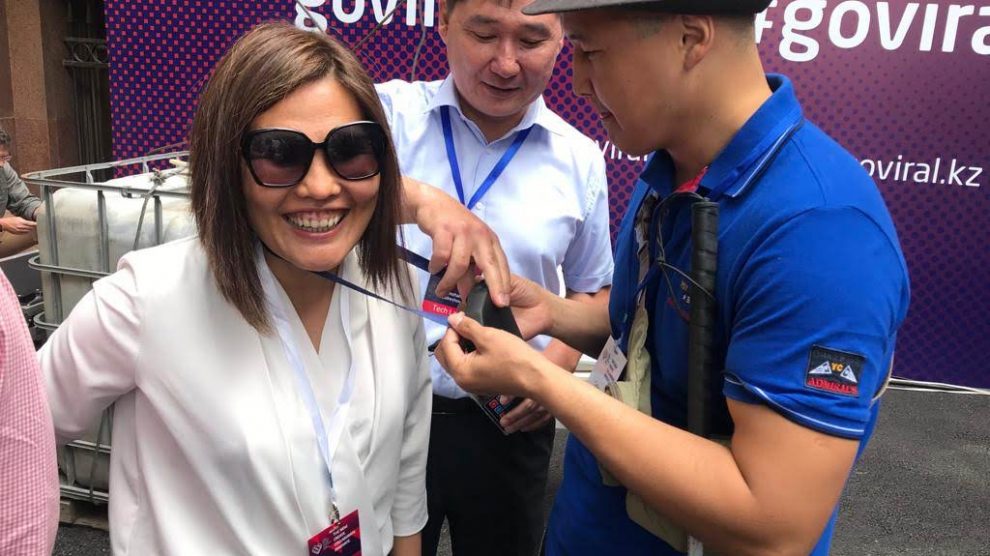In popular culture, echolocation conjures up images of dolphins and bats — but humans can be taught the skill too, and a Kazakh start-up is taking advantage.
Central Asia’s fast-growing start-up ecosystem has plenty of innovative companies to keep an eye on. Kazakhstan’s Sezual is one of them.
From the Kazakh verb sezu, to feel, Sezual is a Nur-Sultan-based company using technology to foster inclusive innovation with devices aimed at helping the blind and visually impaired.
- Kazakhstan and Uzbekistan are emerging as Central Asia’s top start-up hubs
- The new ‘digital normal’ is task for both governments and the private sector
- Croatia’s Rimac reveals new all-electric supercar, the Nevera
“Kazakhstan is a fast-emerging tech hub. Though its start-up ecosystem is in the infancy stage, the most challenging and important part is complete — creating a few strong engineering schools that consistently produce great talent, which can easily compete at the highest level with some of the best engineers in the world,” says Sezual co-founder and CEO Nurbek Yensebayev.
“When there is a large enough pool of skilled people that can solve real problems, it attracts venture capital as well as increases collaboration between large corporations and start-ups.”
Sezual’s main product is an echolocation device that enables the blind and the visually impaired to navigate without sight. In popular culture, echolocation conjures images of dolphins and bats — but humans can be taught the skill too.
Emerging research in the field supports the idea that with training, both sighted and blind individuals can learn how to navigate their environment using “clicks”.
This is precisely where the Sezual echolocation device, which emits a specific high-pulse click reflecting surrounding objects to provide information on their shape, material and distance, can help
Seeing through sound
Sezual says that people with the device can learn how to “see” with sound in two months. They are now conducting tests with volunteers in real life environments.
“We are currently training our team of volunteers to navigate in intense real world environments, such as 360 degree location awareness in busy streets, close quarters sporting activities, advanced coordination in rough terrain and much more,” Yensebayev tells Emerging Europe.
He adds that this data is extremely useful for Sezual’s engineers.
“Testing the device under such conditions gives our engineers incredible insight and ideas to improve upon everything from ergonomics and human factors to performance and usability.”
The potential of the device hasn’t gone unnoticed by international organisations.
In 2020, Sezual became a national nominee of the United Nations World Summit Awards, selected from 342 innovations based on content, functionality, design, technology, innovation, impact on society and value. Sezual’s technology covers eight of the 17 UN Sustainable Development Goals, specifically those related to education, growth and employment, inequality and accessibility of human settlement.
Interest exists from investors too — both domestic and foreign.
“Which is why we are actively moving to a proper legal structure in the United States that can accommodate multiple investors and allow for appropriate board structure, employee stock option plans and more. We are also seeing interest from healthcare organisations as well as Fortune 500 companies and we plan to pursue that as well,” explains Elisar Nurmagambetov, founding partner and board member at the start-up.
Life-changing technology
In the start-up’s native Kazakhstan, the ministry of labour and social protection has, along with medical and academic institutions, participated in tests of the device.
“In one of the tests blind people were able to walk in unfamiliar shopping malls, find stairs, and move to different floors. In another test the blind were able to get up from any place in an auditorium, leave it, then enter through another door and find their initial place,” explains Nurmagambetov.
As a result of these tests, the Sezual Biolocator is now included in the Kazakhstan state register of goods for the disabled.
For now, work on the device continues, with Nurmagambetov saying there has been “significant breakthroughs in user progress”.
“Now, we have a final product that the blind and visually impaired use on a daily basis. In their own words, their lives depend on it. However, we have a roadmap to make the product more native, user friendly and smaller in size.”
Sezual is also working on other inclusive innovation projects, such as tactile TV, electronic signatures, exoskeletons, and software applications.
At the moment, the company is focused on producing Braille tutoring devices. According to the American National Federation for the Blind, only one in ten blind people can read Braille.
Nurmagambetov says the company has received a lot of requests from schools for the blind and visually impaired who voiced a need for self-training Braille devices for use during the Covid-19 pandemic.
“We have developed a tactile electronic self-learning device for all Braille symbols in any foreign language,” he explains.
As for the company’s next steps, Nurmagambetov says they are preparing a rebrand and restructuring that will allow their US-based venture be the main operating company.
With that, they are hoping to reach a broader market and create the necessary ecosystem to attract investors, partners, and customers.
Photo: Sezual.
Unlike many news and information platforms, Emerging Europe is free to read, and always will be. There is no paywall here. We are independent, not affiliated with nor representing any political party or business organisation. We want the very best for emerging Europe, nothing more, nothing less. Your support will help us continue to spread the word about this amazing region.
You can contribute here. Thank you.








Add Comment